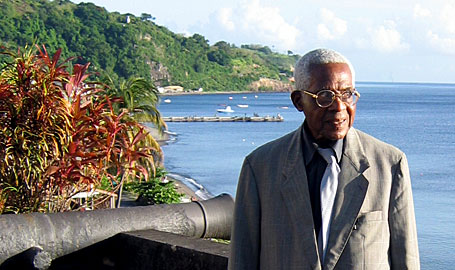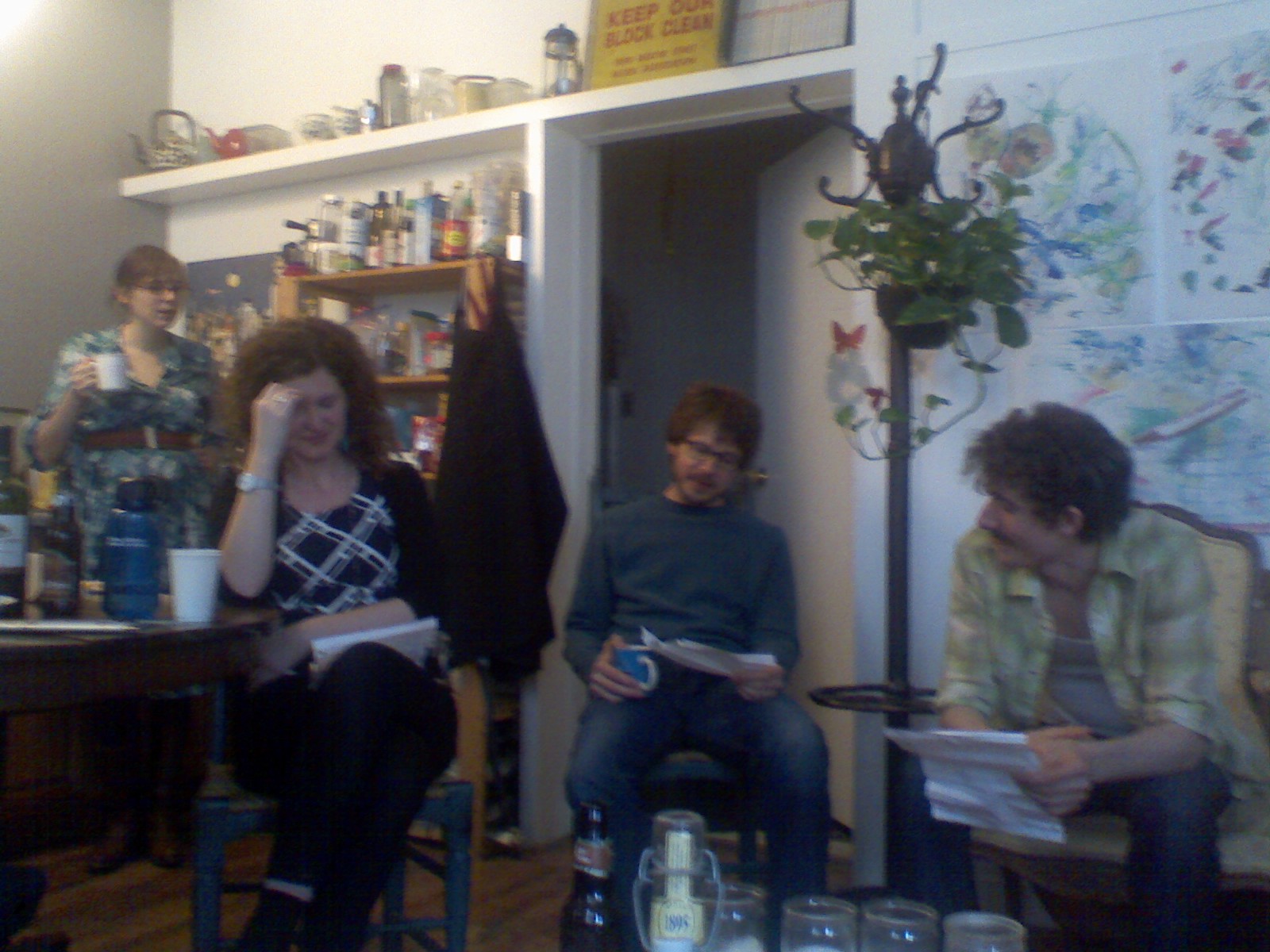POETRY MONTH 30/30/30: Inspiration, Community, Tradition: DAY 30! (Could it be?) :: Lindsey Boldt on Aimé Césaire
 The other night poets Julian Brolaski and E. Tracy Grinnell were in town and in a bar rotten with poets in North beach, we got to talking about translation and our varying positions on the desire vs. intimidation spectrum in relation to doing our own translations. I brought up the Martinican poet, Aimé Césaire, as an example of a poet whose writing would interest me enough to translate it. I had been saying how French can feel too precise, too clean, too “le mot juste” when I really love a hot mess. Aimé Césaire takes French, a very coy language, very good at hiding its skeletons, and busts open the closets letting the nasty flesh-dripping zombies come out...and muck things up. Césaire’s French, one that excretes vivacity, vitriol and jouissance like the flora and fauna, the active volcanoes he invokes in his poems, reminds us of the proliferation of Frenches, just like our current proliferation of Englishes, that exist in spite of and because of France’s imperialist history.
Julian brought up the hybridity of Cesaire’s texts, specifically thinking of his “Cahier d’un retour au pays natal” [Notebook of a return to the native land] which reminded me of my first encounters with Césaire in college. I had never seen prose live and move like his--be that “free”. I had been trying to wake my own prose writing from a death-like stupor when a professor of French and Francophone literature, Maryanne Bailey, who had visited Césaire in Martinique, introduced us to his collected poetry, translated by Clayton Eshleman. We read it both in French and English and I learned in the process that if you want your writing to live on the page it really helps if you hate the language, hate its restrictions and biases. You have to be willing to beat it up and knock it around a bit. You have to let your true ambivalence show. No, more than that, you have to make the language speak your radical visions; the same ones that would tear apart and rip out at the roots the society that grew that language and the shit storm you grew up in. As Césaire says in his essay “The Responsibility of the Artist” when referring to decolonization,“What is necessary is to destroy it, that is, tear out its roots. This is why true decolonization will either be revolutionary or will not exist.” [ed: full text at link]
The other night poets Julian Brolaski and E. Tracy Grinnell were in town and in a bar rotten with poets in North beach, we got to talking about translation and our varying positions on the desire vs. intimidation spectrum in relation to doing our own translations. I brought up the Martinican poet, Aimé Césaire, as an example of a poet whose writing would interest me enough to translate it. I had been saying how French can feel too precise, too clean, too “le mot juste” when I really love a hot mess. Aimé Césaire takes French, a very coy language, very good at hiding its skeletons, and busts open the closets letting the nasty flesh-dripping zombies come out...and muck things up. Césaire’s French, one that excretes vivacity, vitriol and jouissance like the flora and fauna, the active volcanoes he invokes in his poems, reminds us of the proliferation of Frenches, just like our current proliferation of Englishes, that exist in spite of and because of France’s imperialist history.
Julian brought up the hybridity of Cesaire’s texts, specifically thinking of his “Cahier d’un retour au pays natal” [Notebook of a return to the native land] which reminded me of my first encounters with Césaire in college. I had never seen prose live and move like his--be that “free”. I had been trying to wake my own prose writing from a death-like stupor when a professor of French and Francophone literature, Maryanne Bailey, who had visited Césaire in Martinique, introduced us to his collected poetry, translated by Clayton Eshleman. We read it both in French and English and I learned in the process that if you want your writing to live on the page it really helps if you hate the language, hate its restrictions and biases. You have to be willing to beat it up and knock it around a bit. You have to let your true ambivalence show. No, more than that, you have to make the language speak your radical visions; the same ones that would tear apart and rip out at the roots the society that grew that language and the shit storm you grew up in. As Césaire says in his essay “The Responsibility of the Artist” when referring to decolonization,“What is necessary is to destroy it, that is, tear out its roots. This is why true decolonization will either be revolutionary or will not exist.” [ed: full text at link]
POETRY MONTH : Inspiration, Community, Tradition :: Week 2 :: Editorial Recap
 HO! TRIBE!
April 1st brought us poetry month, and on that day of inauguration and celebration many members of this community came together for POTLATCH 2012 to share and co-create. (Photos, updates, and CoCo content to come -- follow link above for gallery). We read, we shared, we sang, we broke bread, we laughed, and we felt -- well, I'll speak for myself -- I felt in my very cells a shift towards what can be possible when a community commits to themselves and each other, and the work we make individually and together.
The elation, the purity of relaxation into common purpose, the love and mutual respect has carried on not only from this event but from this week's posts, kicking off Exit Strata's wholehearted effort to serve as a platform for this love-in and value creation via virtual space.
HO! TRIBE!
April 1st brought us poetry month, and on that day of inauguration and celebration many members of this community came together for POTLATCH 2012 to share and co-create. (Photos, updates, and CoCo content to come -- follow link above for gallery). We read, we shared, we sang, we broke bread, we laughed, and we felt -- well, I'll speak for myself -- I felt in my very cells a shift towards what can be possible when a community commits to themselves and each other, and the work we make individually and together.
The elation, the purity of relaxation into common purpose, the love and mutual respect has carried on not only from this event but from this week's posts, kicking off Exit Strata's wholehearted effort to serve as a platform for this love-in and value creation via virtual space.




